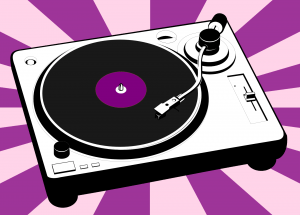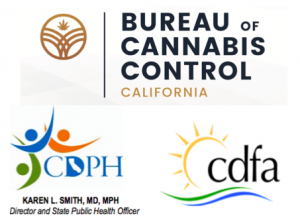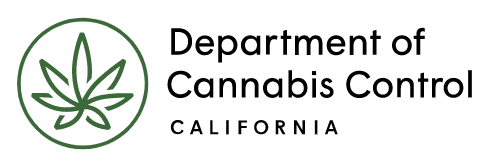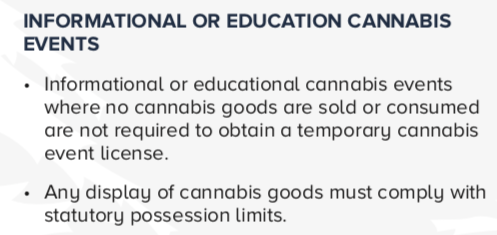Overview of Licensed Cannabis Events in California
by Omar Figueroa
August 10, 2021
Interested in organizing a licensed cannabis event in California? You’re in luck!
California’s new Department of Cannabis Control (hereafter “DCC”) has issued renumbered regulations which retain the two non-statutory events licenses first proposed by the Bureau of Cannabis Control back in 2017: the Cannabis Event Organizer License and the Temporary Cannabis Event License.

EXECUTIVE SUMMARY
In a nutshell, only cannabis event organizers licensed by the DCC are allowed to obtain temporary cannabis event licenses, which are also issued by the DCC. The first step is to apply for and obtain a cannabis event organizer (Type 14) license. The next step is to secure “written approval from the local jurisdiction authorizing the applicant to engage in onsite cannabis sales to, and onsite consumption by, persons 21 years of age or older at the temporary cannabis event at the proposed location.” The third step is to obtain a temporary cannabis event permit from the DCC. Temporary cannabis events can last up to a maximum of four consecutive days, which makes them perfect for three-day weekends.
Notably, sales to adults 21 and older are authorized at cannabis events; however, only “a licensed retailer, a licensed non-storefront retailer, or licensed microbusiness that is authorized to engage in retail sales” may sell cannabis goods directly to consumers. This means that state-licensed cultivators, manufacturers, and distributors who do not also have a state license authorizing the retail sale of cannabis goods are not allowed to engage in direct-to-consumer sales at cannabis events; however, they are allowed to sell indirectly through “a licensed retailer, a licensed non-storefront retailer, or licensed microbusiness that is authorized to engage in retail sales.” Additionally, all cannabis goods at a cannabis event are required to comply with applicable laboratory testing, labeling, and track and trace requirements.
The consumption of cannabis goods is also allowed at cannabis events provided “the consumption of alcohol or tobacco shall not be allowed on the licensed premises.” As expected, access to the area where cannabis consumption is allowed must be restricted to adults age 21 and older, and the event organizer is required to “ensure that cannabis consumption is not visible from any public place or non-age-restricted area.”
LEGAL BACKGROUND & REGULATORY OVERVIEW
In November of 2017, California’s three main cannabis regulatory agencies (the Bureau of Cannabis Control within the Department of Consumer Affairs, CalCannabis Cultivation Licensing within the California Department of Food and Agriculture, and the Manufactured Cannabis Safety Branch within the California Department of Public Health) first released proposed emergency regulations.
 In particular, the Bureau of Cannabis Control proposed two new non-statutory licenses which are not enumerated in the Medicinal and Adult-Use Cannabis Regulation and Safety Act (MAUCRSA): the cannabis event organizer license and the temporary cannabis event license. These new license types got baked into the final non-emergency regulations.
In particular, the Bureau of Cannabis Control proposed two new non-statutory licenses which are not enumerated in the Medicinal and Adult-Use Cannabis Regulation and Safety Act (MAUCRSA): the cannabis event organizer license and the temporary cannabis event license. These new license types got baked into the final non-emergency regulations.
In the summer of 2021, the three agencies were merged into a new state department, the Department of Cannabis Control (DCC) under the Business, Consumer Services, and Housing Agency. Shortly after its creation, the DCC issued renumbered regulations, which you can download in full here. The DCC’s specific regulations relating to the the cannabis event organizer and temporary cannabis event licenses are available for your convenience here.
As noted in the Executive Summary above, sales to adults 21 and older are authorized at cannabis events, and only licensed retailers (storefront and non-storefront) as well as micro businesses authorized to engage in retail sales may sell cannabis goods at cannabis events. This means that state-licensed cultivators, manufacturers, and distributors are not allowed to conduct sales at cannabis events unless they also have a state license authorizing the retail sale of cannabis goods. Those state-licensed cultivators, manufacturers, and distributors who do not also have a state license authorizing the retail sale of cannabis goods are not allowed to engage in direct-to-consumer sales at cannabis events; however, they are allowed to sell indirectly through “a licensed retailer, a licensed non-storefront retailer, or licensed microbusiness that is authorized to engage in retail sales.” Cultivators and manufacturers are also allowed to display cannabis goods for educational purposes and to interact directly with consumers at licensed cannabis events in order to deliver an authentic personal experience.
In contrast to the laissez faire cannabis bazaar of past unregulated events, all cannabis goods at state-licensed cannabis event are required to comply with existing laboratory testing, labeling, and track and trace requirements. On that note, all “cannabis goods sold onsite at a cannabis event shall be transported by a licensed distributor or microbusiness in compliance” with applicable laws and regulations. § 15602(g).
There are no limits on the minimum or maximum number of attendees for a state-licensed cannabis event.
The consumption of cannabis goods is also allowed at cannabis events provided “the consumption of alcohol or tobacco shall not be allowed on the cannabis event premises.” § 15603(c). Not surprisingly, access to the area where cannabis consumption is allowed must be restricted to adults age 21 and older, and the event organizer is required to “ensure that cannabis consumption is not visible from any public place or non-age-restricted area.” § 15603(b).
This separate age-restricted cannabis consumption area (analogous to the “215 area” of past events) implies that persons under the age of 21 and minors are not excluded from cannabis events entirely, but cannot venture outside the boundaries of the non-age-restricted area. This is a welcome relief for parents with children and babes-in-arms, and opens up the possibility of family friendly cannabis events with separate age-restricted areas where adults can consume cannabis, akin to beer gardens at county fairs in California.
LOCATION OF CANNABIS EVENTS
With the passage of Assembly Bill 2020, cannabis events are no longer limited to county fairs and district agricultural associations. Business and Professions Code § 26200, subdivision (e), provides:
(e) (1) This division does not prohibit the issuance of a state temporary event license to a licensee authorizing onsite cannabis sales to, and consumption by, persons 21 years of age or older at a county fair event, district agricultural association event, or at another venue expressly approved by a local jurisdiction for the purpose of holding temporary events of this nature, provided that the activities, at a minimum, comply with all the following:
(A) The requirements of paragraphs (1) to (3), inclusive, of subdivision (g).
(B) All participants who are engaged in the onsite retail sale of cannabis or cannabis products at the event are licensed under this division to engage in that activity.
(C) The activities are otherwise consistent with regulations promulgated and adopted by the department governing state temporary event licenses.
(D) A state temporary event license shall only be issued in local jurisdictions that authorize such events.
(E) A licensee who submits an application for a state temporary event license shall, 60 days before the event, provide to the department a list of all licensees that will be providing onsite sales of cannabis or cannabis products at the event. If any changes occur in that list, the licensee shall provide the department with a final updated list to reflect those changes. A person shall not engage in the onsite retail sale of cannabis or cannabis products, or in any way participate in the event, who is not included in the list, including any updates, provided to the department.
Thus, events at locations such as stadiums, concert halls, and convention centers, are explicitly allowed under California law, provided the local jurisdiction approves.
Critically, the regulations require that an application for a Temporary Cannabis Event License include “written approval from the local jurisdiction authorizing the applicant to engage in onsite cannabis sales to, and onsite consumption by, persons 21 years of age or older at the temporary cannabis event at the proposed location.” § 15601(d)(9). Since local jurisdictions in effect have “veto power” over cannabis events, a prudent cannabis event organizer would be wise to establish good working relationships with local officials in order to secure the requisite written approval from the local jurisdiction.
ROLE OF CANNABIS EVENT ORGANIZER
The DCC has a helpful web site about cannabis events, which explains the role of the event organizer.
Event organizers coordinate all aspects of the event, including:
- Maintaining the event space
- Hiring security
- Posting required signs
- Providing the Department of Cannabis Control (DCC) with a list of participants
- Providing DCC with a diagram showing the layout of the event and where participants will be set up
RULES FOR CANNABIS EVENTS
The DCC’s web site also summarizes some of the rules for cannabis sales at events as follows:
Only distributors can transport cannabis goods to an event.
Only retailers can sell cannabis goods during an event. Retailers must follow all the rules for on-site sales and consumption, including:
- Displays of cannabis goods
- Use of exit packaging
- Age restrictions on sales
- Daily sales limits
- No free samples
- Recording sales in the Track and Trace system
Each retailer must have a specific location where they sell cannabis goods. You cannot sell cannabis goods from mobile carts.
CANNABIS EVENT APPLICATION MATERIALS
For your convenience, below are the latest available (as of this writing) cannabis event application materials. Please keep in mind that in order to obtain a Temporary Cannabis Event License, the event organizer must first apply for and obtain a Cannabis Event Organizer License.
Cannabis Event Organizer Materials
Cannabis Event Organizer License Application
Instructions for the Cannabis Event Organizer License Application
Instructions for Owner Submittal Form
Temporary Cannabis Event Materials
Temporary Cannabis Event License Application
Instructions for the Temporary Cannabis Event License Application
Attachment: List of Licensees That Will Provide Onsite Sales of Cannabis Goods
APPLICATION AND LICENSE FEES FOR CANNABIS EVENTS
There are two types of fees that event organizers need to consider: application fees and license fees. The application fees for both the Cannabis Event Organizer License and the Temporary Cannabis Event License are the same: $1,000. § 15014(a).
Additionally, there is a separate annual license fee for the Cannabis Event Organizer License, which depends on planned number of events per year. (There is no separate license fee for a Temporary Cannabis Event License.) The annual license fee for the Cannabis Event Organizer License starts at $3,000 per license if the event organizer plans “0-5 events annually”, and goes as high as $20,000 per license, if the number of planned events is “greater than 20 events annually.”
Annual License Fee Schedule for Cannabis Event Organizers

Assuming an organizer wants to plan a single annual event, the total fees payable to the DCC would be computed as follows: $1,000 application fee for the Cannabis Event Organizer License, plus a $3,000 annual license fee, plus a $1,000 application fee for the Temporary Cannabis Event License, for a total of $5,000.
If the organizer plans five annual events, the total fees payable to the DCC would be computed as follows: $1,000 application fee for the Cannabis Event Organizer License, plus a $3,000 annual license fee, plus a $1,000 application fee for each Temporary Cannabis Event License ($5,000 for five events) for a grand total of $9,000.
If the organizer plans six annual events, the total fees payable to the DCC would be computed as follows: $1,000 application fee for the Cannabis Event Organizer License, plus a $5,000 annual license fee, plus a $1,000 application fee for each Temporary Cannabis Event License ($6,000 for six events) for a grand total of $12,000.
If the organizer plans ten annual events, the total fees payable to the DCC would be computed as follows: $1,000 application fee for the Cannabis Event Organizer License, plus a $5,000 annual license fee, plus a $1,000 application fee for each Temporary Cannabis Event License ($10,000 for ten events) for a grand total of $16,000.
If the organizer plans eleven annual events, the total fees payable to the DCC would be computed as follows: $1,000 application fee for the Cannabis Event Organizer License, plus a $9,000 annual license fee, plus a $1,000 application fee for each Temporary Cannabis Event License ($11,000 for ten events) for a grand total of $21,000.
If the organizer plans twenty annual events, the total fees payable to the DCC would be computed as follows: $1,000 application fee for the Cannabis Event Organizer License, plus a $9,000 annual license fee, plus a $1,000 application fee for each Temporary Cannabis Event License ($20,000 for twenty events) for a grand total of $30,000.
If the organizer plans twenty-one annual events, the total fees payable to the DCC would be computed as follows: $1,000 application fee for the Cannabis Event Organizer License, plus a $20,000 annual license fee, plus a $1,000 application fee for each Temporary Cannabis Event License ($21,000 for twenty-one events) for a grand total of $42,000.
In addition to state fees, local fees for cannabis events are imposed by some local jurisdictions. For example, in San Francisco, the permit fee depends on the number of anticipated attendees at the proposed cannabis event.
As noted above, a prudent cannabis event organizer would be wise to establish good working relationships with local officials early in the process to lay the foundation for state licensing.
INFORMATIONAL OR EDUCATIONAL CANNABIS EVENTS
The updated regulations do provide that “Informational or educational cannabis events where no sales of cannabis goods or consumption of cannabis goods is occurring are not required to be licensed by the Department.” § 15604(a). This language implies that a license from the DCC may be required for informational or educational cannabis events where the consumption of cannabis goods takes place, even though no sales occur.
The regulations also provide that a “person may display cannabis goods for informational or educational purposes consistent with Health and Safety Code sections 11362.1 and 11362.77.” § 15604(b). These sections reference the adult-use possession limits established by the Adult Use of Marijuana Act (“AUMA” or Proposition 64) in late 2016, and the safe harbor medical guidelines established by Senate Bill 420 in 2004, respectively. This means that individuals who are medical cannabis patients are allowed to display for informational or educational purposes significantly greater quantities of cannabis goods at such events, in accordance with section 11362.77.
These requirements are encapsulated in the Cannabis Event Fact Sheet published by the DCC’s predecessor agency, the BCC (Bureau of Cannabis Control) back in early 2019.
CONCLUSION
California is one of the few places in the world where state-licensed cannabis events can take place in event venues of all kinds. The possibilities for cannabis events beyond the tried-and-true music festivals are endless. Imagine, for example, a Cannabis, Chocolate & Comedy Festival at a local theatre featuring fine cannabis, connoiseur chocolates, and a murder of uproarious comedians. Or how about a cannabis wellness retreat at a destination resort where attendees can enjoy nourishing meals, ganja yoga, and infused-massage-oil bodywork? Or how about an al fresco foodie festival at a spectacular outdoor venue overlooking the Pacific Ocean, featuring gourmet food trucks, cooking demonstrations, and an abundance of appetite-stimulating cannabis goods? Or how about a business to business event at a convention center where buyers for dispensaries and other connoiseurs are able to purchase and consume cannabis goods while interacting with the licensed cultivators and manufacturers who produced those same goods?
In future years, all of these possibilities for cannabis events may come to fruition in California. The only limit is our imagination.
The information herein is provided as a public educational service and is not intended as legal advice. For specific questions regarding the cannabis event organizer license and the temporary cannabis event license in California, please contact the Law Offices of Omar Figueroa at 707-829-0215 or info@omarfigueroa.com to schedule a confidential legal consultation.


